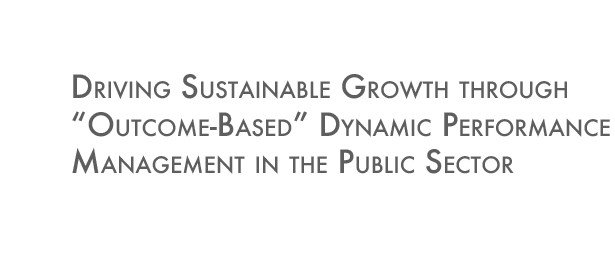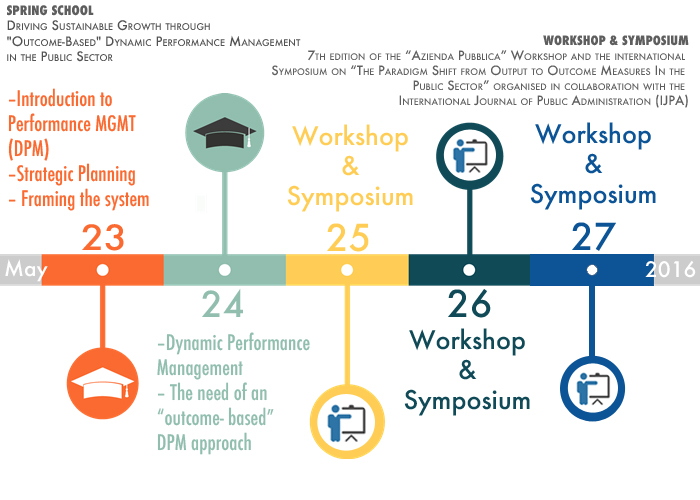
Spring School University of Palermo May 23rd-27th
The Spring School Driving Sustainable Growth Through “Outcome-Based” Dynamic Performance Management in the Public Sector, is offered together with the attendance to the 7th edition of the “Azienda Pubblica” Workshop and the International Symposium on “The Paradigm Shift from Output to Outcome Measures In the Public Sector” organized in collaboration with the international journal of Public Administration (IJPA)
Registration Fee and Procedure
Overview of the program
One of the unresolved problems in public sector research and practice stands into the evaluation and improvement of results produced by invested resources. Related to this, there is also the issue of motivating and orientating public sector decision makers towards a consistent set of goals and objectives.
In the continuous effort to build and sustain a competitive advantage, and to pursue financial stability, public sector organizations may experience rising difficulties due to the dynamic complexity and unpredictability of competitive and social systems where they operate. They are expected to assess their corporate mission, tune their strategic goals, and align to them consistent management objectives as the global economy and social demands change.
Measuring performance targets, aligning them through the organizational structure to foster coordination and accountability, and framing the net of dynamic relationships between the factors affecting such targets, are a key to pursue sustainable development.
The performance paradigm is shifting from measuring outputs to measuring outcomes in the public sector, which increases the level of attention placed on the evaluation of service delivery and opens the door for possible collaborative partnerships between different organizational units within the same municipality, job sector, or region for generating overall public value.
Today, ‘wicked problems’ characterize governmental planning, with a specific concern with social issues. These are complex policy problems, featured by high risk and uncertainty, and a high interdependency among variables affecting them. Such problems cannot be clustered within the boundaries of a single organization, or referred to specific administrative levels or ministries. They are characterized by dynamic complexity, involving multi-level, multi-actor and multi-sectoral challenges. Examples of such problems include social cohesion, climate change, unemployment, crime, homelessness, healthcare, poverty, education, and immigration.
The use of a short-term perspective and of a sectoral approach in the formulation and implementation of strategies may lead to a static view of the system and to lack of coordination in policy-making between different public agencies, non-profit and other private stakeholders. This approach may not support governments to identify sustainable actions, whose policy-making usually refers to several jurisdictions, both in terms of level (e.g.. national, regional, local) and domain (e.g. policing, welfare, education, justice).
The use of an outcome-oriented view of performance to frame and assess the desirability of the effects produced by adopted policies allows governments not only to consider effects in the short, but also the long run. Furthermore, it does not only focus policy effects in the perspective of a single unit or institution, but also under an inter-institutional viewpoint.
Dynamic Performance Management (DPM) is method that is designed to help public sector managers accurately measure and monitor organizational progress and align front-line employees to the organizational strategic objectives. By learning how to motivate and lead a competitive and scalable organization, participants to this training program will emerge with a strategy map for designing, implementing, and managing systems that create value and drive sustainable growth over the long term.
An “Outcome-Based” Dynamic Performance Management approach can significantly support this change towards joined-up government in dealing with wicked problems.
Main benefits of the program
- To frame tangible and intangible factors affecting performance
- To identify delays between causes and effects and gauge their consequences on organizational performance
- To help organizational leaders to intervene on performance drivers, through the design and implementation of sustainable policies
- To perceive trade-offs in decision making, budget allocation and performance evaluation, to gain a view of systemic relationships between different departments and between short and long term
- To measure performance targets and identify related behavioral implications on groups and individuals
- To re-align department managers and front-line employees to organizational strategic objectives
- Free attendance to the International Conference & Symposium on: “The Paradigm Shift from Output to Outcome Measures in the Public Sector”, on May 25th-27th, 2016.3)
Teaching strategy and methodology
The program is delivered to help participants to get a practical view on how to (re)design and improve the relevance of their company’s performance management systems. Through workshops and case-studies, participants will work on framing critical issues on their own organizational success
Participants will master the powerful control systems that successful organizations use to manage cost and other key-performance indicators, particularly in a rebalancing global economy. With a deeper understanding of how to analyze, understand, and communicate strategy, participants will return to their organizations with the tools to manage operational and strategic risk while driving breakthrough innovation and performance.
Faculty
Carmine Bianchi, Professor of Business & Public Management, University of Palermo, Scientific coordinator of CED4 System Dynamics Group, University of Palermo (Director of the School);
Enzo Bivona, Associate Professor of Business Management, CED4 System Dynamics Group, University of Palermo;
Federico Cosenz, Assistant Professor of Business Management, CED4 System Dynamics Group, University of Palermo.

